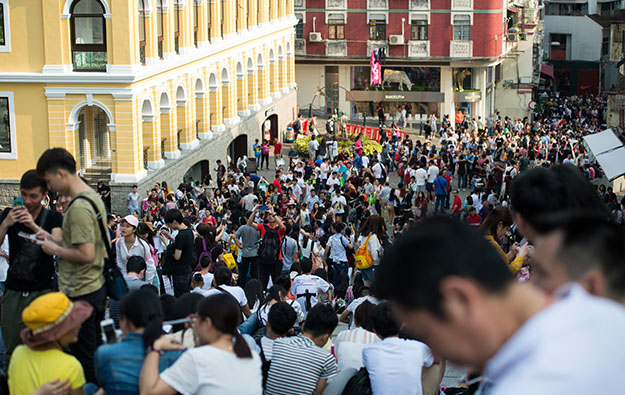Macau public for tourist tax, travel trade not: MGTO
Jan 10, 2020 Newsdesk Latest News, Macau, Top of the deck

Most of the Macau-based general public that responded to the survey portion of a government study on the matter, support the idea of a per-head tax on tourists visiting Macau. Survey respondents working in the local travel trade are mostly against it. Those findings are included in a summary issued on Thursday of the work done by the Macao Government Tourism Office (MGTO) under the “Feasibility Study on Tourist Tax Imposition”.
Work on the study began last year, and was scheduled to be completed in the fourth quarter. It has now been submitted to the city’s government for consideration, said on Wednesday a tourism bureau senior official. He had flagged that the amount being discussed for any such tax was in the range of MOP200 (US$25) to MOP100.
The idea of such a tax was aimed at tackling issues relating to the city’s tourism “capacity”, government officials had stated at the time the survey was launched.
Macau has a land area of only 32.9 square kilometres (12.7 sq miles) according to the city’s Statistics and Census Bureau. The city received more than 39.4 million tourists in 2019, a nearly 10-percent rise on the 35.8-million visitor arrivals recorded in 2018, according to official data.
The study on a tourist tax would serve as “scientific grounds for formulation of government policies”, MGTO said. The local government would also consider a range of factors – namely the health of the local economy, the “destination image” of Macau, and the city’s role in the Guangdong-Hong Kong-Macau Greater Bay Area – when considering the tourist tax subject, the office added in its Thursday statement.The Greater Bay Area is a Chinese central government initiative to bind the people and economies of those places more closely.
MGTO said that under the public survey portion of the study, it had managed to retrieve 14,900 completed questionnaires from among the sets of questionnaire papers it had distributed to the public, including to the Macau general public, travel trade workers and visitors.
Of the respondents identifying themselves as “residents”, MGTO said “95 percent” supported a tourist tax being applied in the city. But for those describing themselves as travel trade industry representatives, “80 percent” were against the idea.
MGTO said “32.2 percent” of the residents expressing support said it should be set “between MOP100 to MOP199”. Another “21.9 percent” of such supporters suggested it should be no more than MOP99.
The tourism bureau also noted that “50.6 percent” of respondents identifying themselves as “visitors” said their intention to visit Macau would be “affected” if a tourist tax were imposed.
MGTO said it had also conducted case studies regarding “other countries and regions” that imposed a tourist tax. Thursday’s press release didn’t mention the places studied. But it suggest findings indicated that imposing a tourist tax might at best only lead to a “slight slowdown” in the growth of visitor arrivals – and only at the point of imposition of such a measure. For some places, it had made no difference to arrivals growth.
The tourism bureau also mention in its Thursday summary of the study that it had indicated “complicated administrative formalities” could result from imposing such a tourist tax, as a large number of Macau’s inbound visitors came via land-based border crossings that are already busy at peak times
The full version of MGTO’s feasibility study was not – at the time this story went online – available to the public.
Related articles
-
 Macau average 5-star 1H rate 96pct of...
Macau average 5-star 1H rate 96pct of...Jul 22, 2024
-
 Visitors, steady spend to support Macau...
Visitors, steady spend to support Macau...Jul 18, 2024
More news
-
 Donaco EBITDA up y-o-y to above US$4mln...
Donaco EBITDA up y-o-y to above US$4mln...Jul 26, 2024
-
 HK listed Palasino upgrades Czech...
HK listed Palasino upgrades Czech...Jul 26, 2024
Latest News
Jul 26, 2024
Border-casino operator Donaco International Ltd has achieved a 164.17-percent year-on-year increase in its latest quarterly group earnings before interest, taxation, depreciation and amortisation...Sign up to our FREE Newsletter
 (Click here for more)
(Click here for more)
Pick of the Day
”We’ve got more traction outside of Macau at the moment. But Macau’s going be a bigger focus for us”
David Punter
Regional representative at Konami Australia
Most Popular
 Sheraton brand to exit Londoner Macao, to be Londoner Grand July 25, 2024
Sheraton brand to exit Londoner Macao, to be Londoner Grand July 25, 2024  Macau regulator probes unlicensed gaming agents July 24, 2024
Macau regulator probes unlicensed gaming agents July 24, 2024  Philippines gives 20k aliens in POGOs 60 days to leave July 25, 2024
Philippines gives 20k aliens in POGOs 60 days to leave July 25, 2024  Philippines-listed DigiPlus says not affected by POGO ban July 24, 2024
Philippines-listed DigiPlus says not affected by POGO ban July 24, 2024  Sands China 2Q EBITDA down q-o-q amid low hold, renovation July 25, 2024
Sands China 2Q EBITDA down q-o-q amid low hold, renovation July 25, 2024






